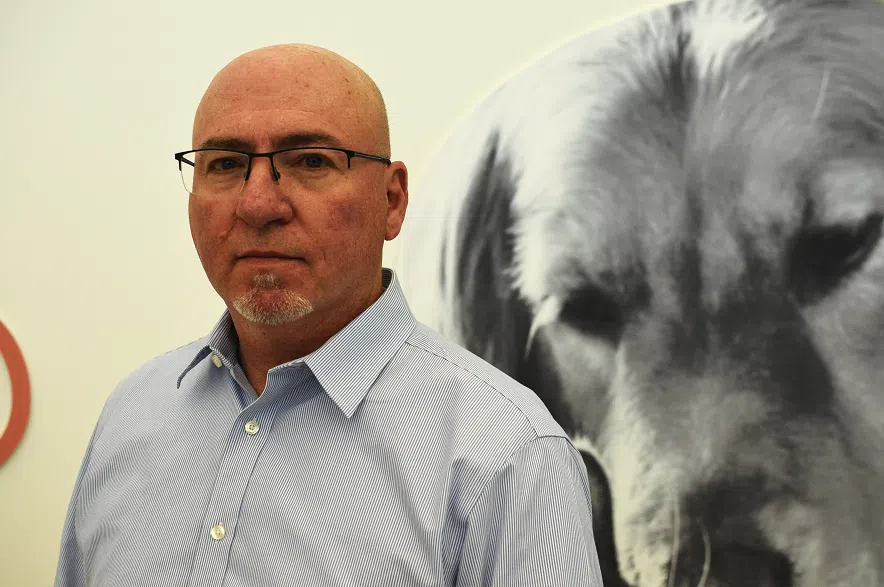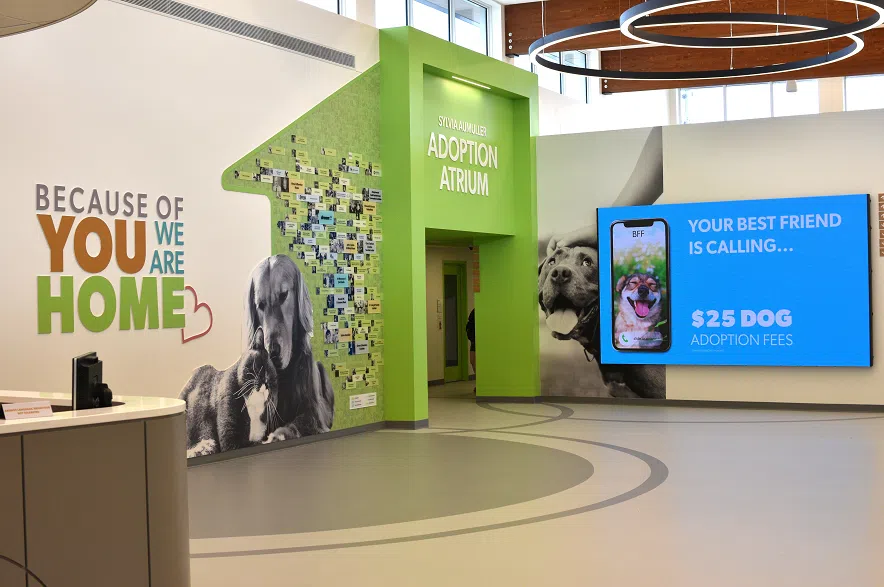Man’s best friend is struggling to find a home.
Saskatchewan rescue groups are struggling to keep up with the number of dogs in need, and are calling on the community to help by adopting and fostering.
“I think it’s getting worse,” said Nicole Sinclair, who volunteers with animal rescue group CC RezQ’s.
Her group specializes in fostering and adopting dogs from rural communities that are in desperate need. They constantly update their Instagram and Facebook pages with posts about new dogs in need of homes.
“The prairie regions have hit a critical point, and the situation is pretty dire,” Sinclair said. “Any recent large call-outs for fosters haven’t really materialized into anything.”
The Regina Humane Society is also seeing an influx of dogs. The organization has lowered its adoption fee to $25 in an effort to encourage adoptions.
“The majority of dogs are coming in as strays, but are not getting reclaimed,” said Bill Thorn, the humane society’s director of marketing and public relations. “The average stay, traditionally, for a dog is seven to 10 days. Right now, year-to-date, it’s 19.”
Unlike CC RezQ’s, the Regina Humane Society’s primary focus is supporting animals in the city and acting under contract as an impound facility. But like CC RezQ’s, the humane society is also looking to expand its roster of potential foster homes to help free up shelter space.
“No one wants to get into a situation where we have to make a tough decision about any given animal because of that,” Thorn said. “We have not euthanized a dog for space in 20 to 25 years, and we don’t want to start again.”

Bill Thorn, the Regina Humane Society’s director of marketing and public relations. (Giancarlo Cininni/980 CJME)
Rural Saskatchewan has long struggled with an abundance of stray dogs. Sinclair says the remoteness of many communities and their lack of infrastructure make controlling stray dog populations difficult.
“Rural areas don’t have access to a lot of the things that we are privileged enough to have access to in the city, like veterinary care or fences or bylaw officers,” she said.
Sinclair said the COVID-19 pandemic made the situation even worse.
“I think it will take years to recover from the damage done,” said Sinclair. “We saw a huge influx of people within cities adopting dogs. And then when the pandemic was over, (they) surrendered those dogs.”
Thorn said it’s an issue that the humane society sees all across North America.
READ MORE:
- Regina Humane Society howling for help after it runs out of room for dogs
- Regina Humane Society offers a sneak peek inside its new building
- ‘Canine crisis:’ Humane society hoping to find homes for 40 dogs
“Now that things have changed back to a bit more normal, (people are) maybe working in the office again or they want to travel. A lot of people are finding they don’t have that time. So we’ve seen an increase in surrenders,” he said.
Thorn said the rising cost of living is another reason people are giving up their pets.
“People are moving because they maybe can’t afford a mortgage, or rents are going up and they’re looking at a place that doesn’t allow pets, so they’re not able to keep their pets,” he said.
The change in seasons is another factor. Sinclair said there is usually an increase in strays during the spring.
“What people don’t want to hear is, the reason there are a lot more dogs in the spring is because less of them are dying in the cold,” she said.
Looking outside of Saskatchewan
While there is an overpopulation of strays in Saskatchewan, there is demand in other parts of Canada. CC RezQ’s works with partners outside the province to find homes where supply of animals is low and demand is high.
“We’ve built a really great partnership with a rescue in Vancouver called Endless Possibilities. And we fly them dogs every couple of weeks, because Vancouver does not have the dog overpopulation problem we do,” Sinclair said.
The Regina Humane Society is considering similar partnerships.
“We had a look the other day – I think it was three humane societies in New Brunswick, and they all had one dog available,” Thorn said. “We are actually exploring ways. Can we work with someone out there to move animals to the east coast, where they can find a home?”

The Regina Humane Society has lowered its adoption fee to $25 in an effort to encourage adoptions. (Giancarlo Cininni/980 CJME)
But, according to Sinclair, getting dogs out of the province can be a complicated process. Direct flights to locations that demand rescues can be sparse. This has compromised CC RezQ’s operations with another rescue in Ottawa.
“We aren’t putting dogs on a flight that has layovers. It’s too risky,” Sinclair said. “The Vancouver pipeline works because the infrastructure is there. The Ottawa pipeline is really difficult, because the infrastructure is not there.”
Sinclair also pointed out the issue of capacity. Some dogs are simply too large to be transported on flights – Air Canada, for example, only allows dogs up to 70 pounds. That means larger breeds, which are already in less demand, have to find adopters closer to home.
A rural rescue may be for you
Sinclair believes that the stigma often attached to rural strays is unfounded. She says many of these dogs make great pets.
“Rez dogs are your best bet,” Sinclair said. “They are usually very well-socialized dogs.”

Local rescues are reporting serious struggles finding adoptive homes for dogs. (Giancarlo Cininni/980 CJME)
She said fosters can have a large impact on assisting communities, and said her organization offers flexible ways to get involved.
“We’re always looking for that kind of care. Long-term, short-term; we’ll take whatever we can get at this point,” she said.
“I started four years ago, I think, and I’m gonna take this one litter of puppies and see how it goes. And I think there’s probably been 300 dogs processed through my home since then.”
However, she advised people to carefully consider what they are getting into if they decide to accept the responsibility of adopting a dog.
“We need people to not adopt dogs if they’re not going to keep them for the duration of their lives,” Sinclair said.








